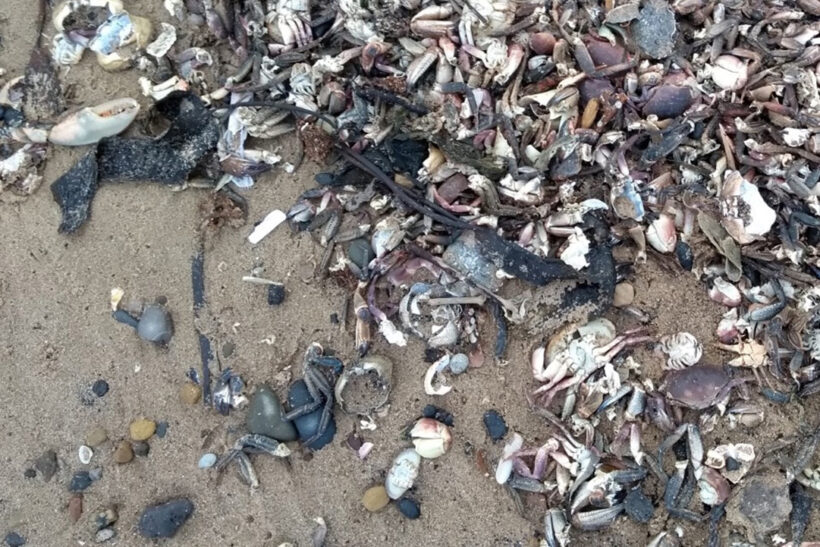Fishermen in Teesside and North Yorkshire are continuing to suffer from the effects of the mass shellfish die-off that first hit the region in autumn 2021. Research by academics at York, Durham and Northumbria universities funded by The Fishmongers’ Company to pinpoint the cause of the deaths is continuing, but the emphasis has now shifted to trying to ensure that nothing similar ever happens again.
Representatives of the North East Fishing Collective (NEFC) met university researchers at the end of May, but one comment was that they had ‘gone backwards rather than forwards’ in the investigation because of its complexity and the length of time it was taking.
Meanwhile, dredging for the Tees Freeport and associated developments and the dumping of contaminated spoil off the Tees, which fishermen have always blamed for the deaths, is continuing.
James Cole, chairman of Whitby Commercial Fishermen’s Association and a member of the NEFC, who was at the meeting with the university researchers, told Fishing News: “It’s taking a long, long time to get through this process, and hopefully they can carry out some more studies.
“I think the argument about pyridine causing the die-off has gone away – it’s going to take too much to prove. We’ve got all the evidence, but the government has rejected everything we’ve put forward.”
An independent panel of scientists appointed by Defra to examine the evidence in 2022 concluded that the most likely cause was a pathogen or disease new to UK waters (FN, 2 February, 2023, ‘Unknown disease may be cause of shellfish deaths’), but the NEFC rejected this, and also earlier claims that the cause was an algal bloom.
“Whatever evidence we come up, with they refute it,” said James Cole. “But the ecosystem is knackered, it’s fried in the Tees Bay south, and it’s going to take years and years to recover – if it ever does.
“The next aim of the collective is to be proactive and try to make sure that this doesn’t happen again, here or on anybody else’s part of the coastline, but it’s an absolutely uphill struggle.
“The universities have come up with some proposals for more rigorous testing of dredged material – we need processes in place that can be properly monitored.”
James Cole said ‘nothing has changed’ in terms of dredging in the Tees. “They are taking spoil out in barges and dumping it on the Tees spoil grounds off Redcar,” he said.
“They get a licence, and then just do what they want. There are no checks and balances, no ‘we’ll be more rigorous in our testing in light of what’s gone on before’. It’s absolutely disgusting.”
Teesside is being developed as a ‘green’ centre for building wind turbines, with a carbon capture pipeline from the North Sea and a service centre for Dogger Bank wind farms. “They’re using the green agenda as a smokescreen to do what they want,” said James Cole. “But the ecosystem can’t take extra dumping of spoil in that area. “The ecosystem, fishermen’s jobs, tourism – they say to hell with all that, this project must go ahead regardless, because it’s a green project.”
‘Hanging on by a thread’
Fishing is poor for crab, and lobster prices are ‘rubbish’, said James Cole. “We’re hanging on by a thread. Crab catches should have been picking up this month [May]. But the catches are way, way down.
“It’s unbelievable – crabs are just about non-existent on the Whitby grounds, and the further inshore and toward Teesside you go, the less you get. They’re counting crabs individually in their day’s shots.
“We’ve caught just over a tonne for the month, where we should have been into the teens of tonnes. We’re not seeing any small crabs either – it’s like the whole crab stock has more or less vanished. If it had been fishing effort, you would have seen small crab, but there’s just a complete dearth of them.
“Lobsters are fairly good, but the price we’re getting is rubbish compared with what it costs to run a boat. Running costs have doubled, but lobster prices have been slashed, and that’s our main catch now.
“Buyers say it’s the cost of living crisis and people just don’t want to buy lobster because it’s too expensive, but we’re still getting a rubbish price – we’re not getting the price for a premium product. Every buyer’s saying the same – take it or leave it.
“Scallops are out because we’re not rigged for them, crabs have taken a hammering, so you’re just left with lobster. It’s no good because you head towards a stock crash when you all target one species.
“And then when you get a price drop, you’re very vulnerable because you’ve nothing else to make it up. Then you try harder, and before you know where you are, another stock’s gone out of the window.
“It’s crazy to fish like that.”
This story was taken from the latest issue of Fishing News. For more up-to-date and in-depth reports on the UK and Irish commercial fishing sector, subscribe to Fishing News here or buy the latest single issue for just £3.30 here.
Sign up to Fishing News’ FREE e-newsletter here.








